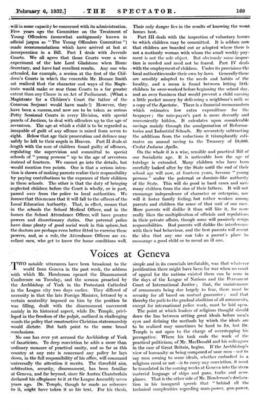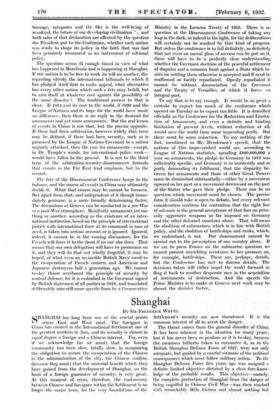Voices a t Geneva
filWOnotable utterances have been broadcast to the world from Geneva in the past week, the address with which Mr. Henderson opened the Disarmament Conference on Tuesday, and the sermon preached by the Archbishop of York in the Protestant Cathedral in the League city two days earlier. They differed of necessity in that the late Foreign Minister, fettered by a certain neutrality imposed on him by the position he was filling, dealt with the disarmament movement mainly in its historical aspect, while Dr. Temple, privi- -leged in the freedom of the pulpit, outlined in challenging words the policy that constructive Christian statesmanship -would dictate. But both point to the same broad :conclusions.
No one has ever yet accused the Archbishop of York of fanaticism. To deep conviction he adds a more than 'ordinary measure of practical sanity, and so far as this country at any rate is concerned any policy he lays down, in the full responsibility of his office, will command. 'universally the attention- it merits. The threefold shit, 'arbitration, security, disarmament, has been familiar at Geneva, and far beyond, since Sir Austen Chamberlain declared his allegiance to it at-the League Assembly seven years ago. Dr. Temple, though he made no reference 'to it, might have taken it as his text,- For his thesis,
simple and in its essentials irrefutable, was that whatever justification there might have been for war when no court of appeal for the nations existed there can be none in the days of the League of Nations and the Permanent Court of International Justice ; that, the maintenance of armaments being due largely to fear, there must be security for all based on mutual guarantee ; and that thereby the path to the gradual abolition of all armaments, except for international police work, must be laid open.
The point at which leaders of religious thought should draw the line between setting great ideals before men's eyes and defining the methods by which the ideals are to be realized may sometimes be hard to fix, but Dr. Temple is not open to the charge of overstepping his 'prerogative: Where his task ends the work of the . practical politicians, of Mr. MacDonald and his colleagues . in the case of Great Britain, begins. If the Archbishop's 'view of humanity as being composed of sane men—not to *. say men owning to some ideals, whether embodied in a .religious creed or not—is to carry any conviction, it must be translated.in the coming weeks at Geneva into the stern :material language of ships and guns, tanks and aero- planes. That is the other side of Mr. Henderson's.deelara- 'tion in his inaugural speech that "behind all the 'technical complexities regarding anan-power, gun-power, tonnage, categories and the like is the well-being of mankind, the future of our developing civilization " ; and both sides of that declaration are.:affected by the question the President put to the Conference, whether each nation was ready to shape its policy • in. the faith that war had been genuinely renounced as an instrument of nAtional policy.
The question seems ill enough timed in view of what has happened in Manchuria and is happening at Shanghai. If one nation is to be free to work its will on another, dis- regarding utterly the international tribunals to which it has pledged itself first to make appeal, what alternative has every other nation which such a fate may befall, but to arm itself at whatever cost against the possibility of the same disaster ? The traditional answer to that is clear. If 1914 And its cost to the world, if 1920 and the League of Nations and its hope for the world have made no difference, then there is no reply to the demand for armaments and yet more armaments. But the real lesson of events in China is not that, but the precise opposite. If there had been arbitration, however widely that term may be defined, if there had been security, such as is , promised by the League of. Nations Covenant to a nation unjustly attacked, then the case for armaments— except, in Dr.- Temple's words, for international police work— would have fallen to the ground. It is not to the third term of the arbitration-security-disarmament formula that events in the Far East lend emphasis, but to the second.
The fate of the Disarmament Conference hangs in the balance, and the course of events in China may ultimately decide it. What that course may be cannot be foreseen. But apart from that, and independent of it though imme- diately germane, is a more broadly determining factor. The discussions at Geneva can be conducted in a pre-War or a post-War atmosphere. Manifestly armaments are one thing or another, according as the existence of an inter- national institution, based on the principle of international justice with international force at its command in case of need, is taken into serious account or is ignored. Ignored, indeed, it cannot be in the coming discussions, for the French will force it to the front if no one else does. That means that our own delegation will have to pronounce on it, and they will do that not wholly forgetful, it may be hoped, of what even an invincible British Navy owed to the co-operation of French cruisers and American and Japanese destroyers half a generation ago. We cannot to-day throw overboard the principle of security by mutual defence, for it is embodied in the Covenant signed by British statesmen of all parties in 1919, and translated deliberately into still more specific form by a Conservative
Ministry in the Locarno Treaty of 1925. There is no question at the Disarmament Conference of taking any leap in the dark, or indeed in the light, for the deliberations will certainly not be marked by that kind of 'progress. But unless the conference is to fail definitely, so definitely that not even an unreal gloss of success can be put on it, there will have to be a perfectly clear understanding whether the Covenant doctrine of the peaceful settlement Of disputes and a common front against a State which in- sists on settling them otherwise is accepted and if need -be reaffirmed or tacitly repudiated.. Openly- repudiated it cannot be without denunciation of the Covenant and the Treaty of Versailles, of which it forms an
integral part. - To say that is to say enough. It would be as great a mistake to expect too much of the conference which opened on Tuesday as to expect too little. It is described officially as the Conference for the Reduction and Limita- tion of Armaments, and even a definite and binding limitation at present levels, without reduction at all, would save the world from some impending perils. But there must be some reduction. To say nothing of the fact, mentioned in Mr. Henderson's speech, that the nations of this impoverished world arc, according th League of Nations statistics, spending £800,000,000 a year on armaments, the pledge to Germany in 1919 was sufficiently specific, and Germany is so insistently and so justly demanding its fulfilment, that the disparity be- tween her armaments and those of other Great Powers must be diminished substantially—either by a movement upward on her part or a movement downward on the part of the States who gave their pledge. There can be no question which movement must be chosen. The precise form it should take is open to debate, but every relevant consideration confirms the contention that the right line of advance is the general acceptance of that ban on prim- arily aggressive weapons so far imposed on Germany and the other defeated countries alone. That will mean the abolition of submarines, which is in line with British policy, and the abolition of battleships and tanks, which, we understand, is not. But disarmament cannot be carried out to the prescription of one country alone. If we are to press France on the submarine question we cannot present unyielding resistance to her pressure on, for example, battleships. These are, perhaps, details, but the Conference has met to discuss details. The decisions taken will either impel the world forward Or fling it back to another desperate race in the acquisition of instruments of destruction. And ' the speech the Prime Minister is to make at Geneva next week may be almost the decisive factor.









































 Previous page
Previous page